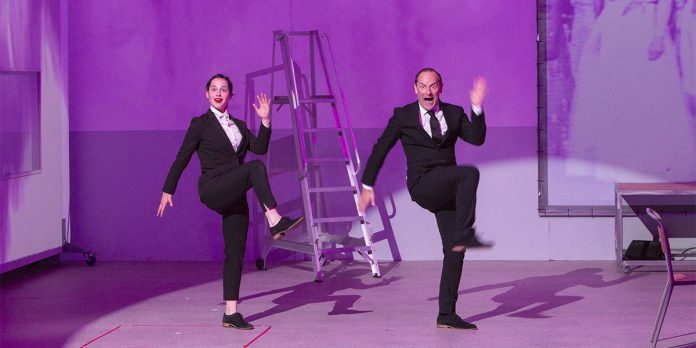Since March 2020, technology has been harnessed in many ways to create entertainment spaces that maintain the feel of a traditional live event, while following COVID-19 guidelines. Take Least Like the Other, Searching for Rosemary Kennedy, for example – a theatrical performance backed by the Irish National Opera. With the rising tide of COVID-19, the logistics of this touring performance, which features an entire ensemble cast and live orchestra, seemed suddenly unfeasible. So, if the show was to go ahead, the production would need to find an innovative way to recreate an orchestra that was no longer in the room… Enter, David Sheppard of Sound Intermedia.
“As a touring artist working around the world, I reached a point where I struggled to justify touring with the ongoing climate crisis,” commented Sheppard. “I began looking at new ways of how we can bring the experience of a performance to an audience without having to tour the ensemble with us.” This mindset meant Sheppard was the right person to find a COVID-19 compliant solution to this particular theatre project. Understanding that simply streaming playback of an orchestra using either an in-house PA or regular line array would not cut it, he explored the possibility of using a Soundscape solution to create a more immersive audience experience.
Using d&b audiotechnik Soundscape, the sounds from the orchestra could be placed into different areas of theatre, powered by a DS100 Signal Engine. “We were lucky with this project in that the composer [Brian Irvine] is very forward thinking and was very excited about the level of control Soundscape could give the production.”
The reinvented show went into rehearsals in a warehouse in Belfast that in a previous life had been used to host raves. The space was transformed from a nightclub to an opera house with clever draping and construction to mirror the O’Reilly Theatre in Dublin, where the production was set to open. It was decided that while Sheppard would rehearse with the team in Belfast, when it came to moving the show back to Dublin, Kevin McGing would implement the sound design from there.
“The handover of Soundscape was seamless; at that point we had all bought into it and understood its simple yet highly creative qualities,” explained Sheppard. “The ease of production, as well as the support from d&b ensured I was confident in handing over the reins once it left Belfast.”
d&b’s Adam Hockley, Education & Application Support, who specialises in Soundscape, commented on theatre’s rising adoption of Soundscape. “There have certainly been a lot of productions from the theatre world that have been very interested in the possibilities that Soundscape could bring to their production,” he stated. “The ultimate goal of many audio engineers in theatre is to make the audio setup as transparent as possible, and what we have with Soundscape is a workflow that makes this possible.”
Hockley explained how 2020 had also seen d&b improve software and offerings to customers. In fact, the company recently announced a series of software updates to enhance users’ ability to deliver extraordinary acoustic experiences with the comprehensive Soundscape toolkit. The updates include significant developments for the En-Scene and En-Space tools.
“At d&b, we are planning ahead and ensuring the Soundscape platform is not only easy to deploy and accessible, but significantly advanced for when it’s possible to have events again,” said d&b audiotechnik Product Manager, Georg Stummer. “The recently released features not only significantly increase the predictability and flexibility of Soundscape, but also the ease of implementation from small theatre productions to large, complex applications. We are constantly driven by customer feedback and these updates reflect the market’s leading requests, ensuring we can further embed Soundscape as the industry standard in immersive sound and deliver further capabilities to our customers’ creative endeavours.”
Although this reinvention of the project was developed to create a solution to COVID-19 restrictions, Sheppard believes that this project could act as a blueprint for future live events.
“Everyone in this industry loves to travel and share our cultures with others around the globe. However, there is a need to consider how necessary the sheer numbers of people that travel are, and how as an industry we could start looking at our carbon footprint,” he commented.
He believes that, “if we have more options to creatively control what is happening on each stop of a tour remotely or use technology to enhance the audience experience through flexible playback or streaming, while ensuring artists still receive income, then perhaps it would need fewer people to travel with a show”.
As for Least Like the Other, Searching for Rosemary Kennedy – the production is hoping to open in Dublin as soon as Ireland reduces the current COVID-19 restrictions.
This article originally appeared in issue #259 of TPi, which you can read here.
Photos: Patrick Redmond & Gavin O’Sullivan






